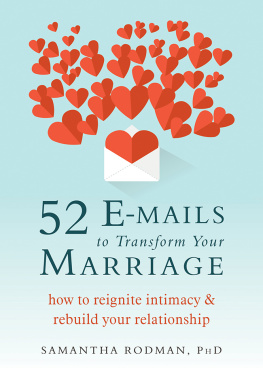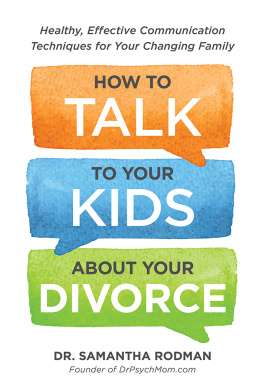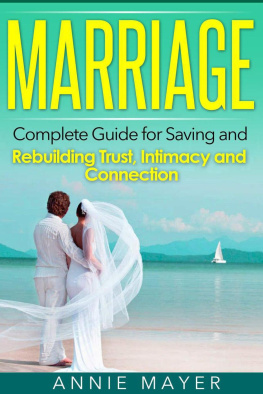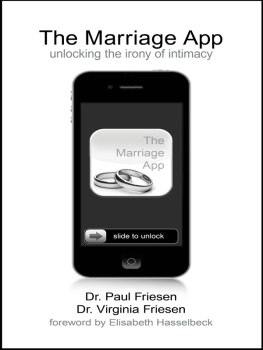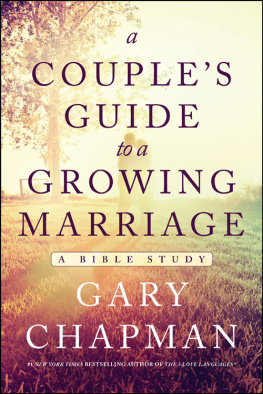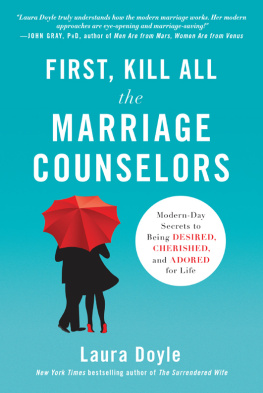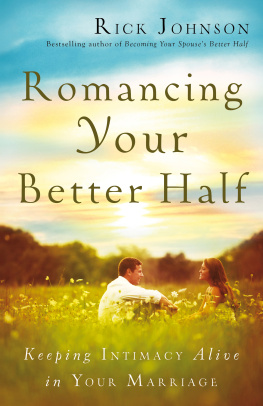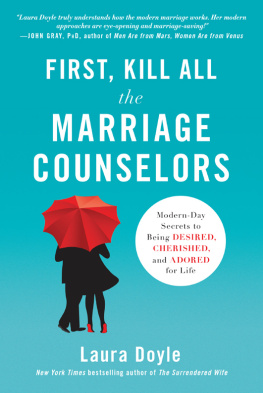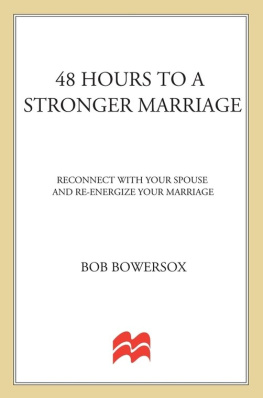
This is a gem of a book that distills essential wisdom from renowned couples therapists into a practical guide for reconnection and couples repair. Samantha Rodman writes with understanding, wisdom, and humorand she really gets the issues that divide couples, and the art and science of reconnection.
Melanie Greenberg, PhD, licensed clinical psychologist, writer for TheMindfulSelf-Express blog at psychologytoday.com, and author of TheStress-Proof Brain
52 E-mails to Transform Your Marriage is a life preserver for those struggling to create or reclaim emotional intimacy in their relationships. Couples committed to growing closer will find invaluable ideas and step-by-step guidelines to better understand each other, reconnect emotionally, and resolve conflicts that can be tough to talk about in person.
AndreaBonior, PhD, licensed clinical psychologist and author of TheFriendshipFix
People often tell me they are hesitant or even afraid to express their deepest needs to their spouses. And yet, self-expression is a specifically transformative ingredient that will close the emotional distance between two people. With 52 E-mails to Transform Your Marriage, Samantha Rodman teaches how to rebuild a warm and tight connection. Engaging to read and full of insight, this book demonstrates how to break barriers and re-conjure the magic of romantic love.
JillP. Weber, PhD, psychologist and author of The Relationship Formula Workbook Series and Having Sex, Wanting Intimacy
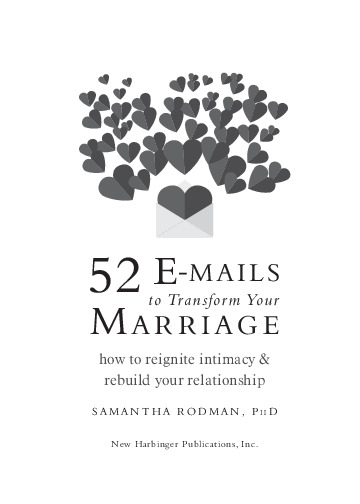
Publishers Note
This publication is designed to provide accurate and authoritative information in regard to the subject matter covered. It is sold with the understanding that the publisher is not engaged in rendering psychological, financial, legal, or other professional services. If expert assistance or counseling is needed, the services of a competent professional should be sought.
Distributed in Canada by Raincoast Books
Copyright 2016 by Samantha Rodman
New Harbinger Publications, Inc.
5674 Shattuck Avenue
Oakland, CA 94609
www.newharbinger.com
Cover design by Amy Shoup
Acquired by Jess OBrien
Edited by Jennifer Eastman
All Rights Reserved
Library of Congress Cataloging-in-Publication Data on file
To my husband, with love.
Contents
A few years into a committed relationshipand often after marriage or having kidsmany couples start to feel disconnected or dissatisfied. This can feel like loneliness or like youre just not on the same page anymore. There are so many things keeping couples busy, including work, kids, housework, and social or leisure activities. Sometimes you barely have ten minutes to talk to your partner, and when you do, its about logistics, like home repairs, finances, or whos picking up the kids from preschool.
As a couples therapist, I see many couples whose relationships look great to the outside world. The partners love each other and have similar goals and values. If they have kids, they parent well, as a team. Despite these indications that they are a happy couple, however, one or both partners find themselves wondering if they even know each other anymore. They gamely schedule date nights, but these often leave both partners feeling disappointed at their lack of connection and intensity. Conversations can turn superficial and unfulfilling. There may be a platonic roommate dynamic or differences in sex drives that lead to resentment.
Other couples still feel connected, but they fight so frequently that they wonder if they belong together or if they would be better off apart. They are locked into unhealthy dynamics in which neither feels understood or accepted. Trust may be an issue, and discussions quickly escalate.
Still other couples have faced a tremendous stressor, like infidelity or another kind of betrayal. They are trying to get back on their feet and move forward together, but they doubt that they can ever feel loved and fully secure with each other again.
All of these types of couplesand anyone who wants to connect on a deeper level with a partnerwould benefit from using this book to rekindle feelings of understanding, acceptance, and joy within their relationship. The work may be challenging, and this book is only for couples with a genuine desire to look inward and explore each partners contribution to current relationship issues.
The exercises in this book are designed for couples who are intrinsically motivated to change in a positive way in order to create a more loving and authentic connection. If youre only going through the motions or trying to prove to your partner how wrong he or she has been about areas of conflict, this book (or any other relationship help book) will not have any significant or real effects.
E-mail is an excellent way to reconnect and to strengthen your relationship, whether it is disconnected, conflictual, ambivalent, or just lacking a spark. In-person conversations can make some people feel tongue-tied, and in some relationships, partners tend to interrupt one another in their efforts to feel heard and validated. Talking can quickly turn into fighting, especially about long-standing, sensitive topics. There is usually one partner, often the female, who longs to have deep, emotional conversations, while the other partner finds these conversations intimidating, pointless, or even harmful.
As an alternative to these frustrating discussions, e-mail correspondence can be less threatening and can allow for deeper examination of issues. Almost everyone e-mails on a regular basis, and writing an e-mail can take as much or as little time as you want. There are no passive aggressive sighs or eye rolls in an e-mail exchange, so conversations can often go deeper, since neither person feels dismissed or invalidated. And they cant escalate as rapidly as in-person conversations, which frequently end in harsh words that partners later regret.
Some readers may ask, Why not texting or chatting? When you text or chat, you can only type a few words or sentences before your partner feels compelled to respond. There is more pressure to respond instantaneously, particularly about emotionally charged issues. With e-mail, you can organize and express all of your thoughts without worrying about interruption or having your unedited thoughts read in real time. As any couple knows, sometimes your first expressed feelings can sound thoughtless or insensitive. If you reread your e-mail once or twice before sending, you can avoid hurting your partner by blurting something out in the heat of emotion that you may not really feel. E-mails can also put two people on an equal playing field if one is a quicker thinker or talker. After you become adept at expressing yourself in writing, you can use the communication skills youll have learned to make your face-to-face conversations more productive and satisfying.
This book contains fifty-two e-mail assignments, spanning twelve areas that couples often find useful to discuss in order to feel closer and more connected. These e-mails will help couples, whether theyve been together for months, years, or decades, to learn new things about each other and to feel more intimately bonded. Couples who feel disconnected or bitter will have learned the origin of one anothers issues, which promotes empathy and understanding. Often, just knowing where your partners personality traits or behavior patterns come from can go a long way toward feeling closer.
Next page
